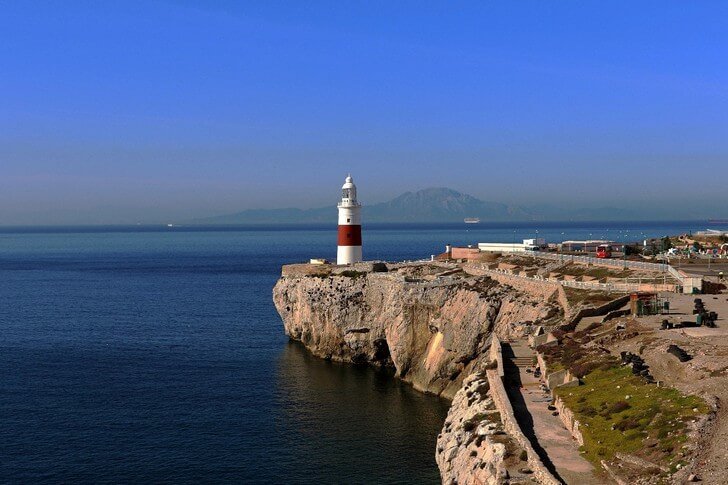The city-state of Gibraltar is located in the most strategically important place on the planet - at the exit from the Mediterranean to the Atlantic Ocean. Many people come here to see Africa while standing in Europe. You can explore the city not only in breadth, but also by climbing a rock that towers like a giant in the middle of the peninsula. This is the main attraction of Gibraltar. For tourists, there is expanse here - viewing platforms with picturesque views, a reserve with rare monkeys, labyrinths of tunnels, a suspension bridge.
Given the geographical position of the city, there were many bloody battles and wars in its history, so a large number of bastions, casemates, fortress walls, fortifications and defense posts have been preserved here. Most of them have been restored and are available for inspection.
What to see and where to go in Gibraltar?
The most interesting and beautiful places for walking. Photos and a short description.
- Rock of gibraltar
- Magots
- Ocean village
- Gibraltar airport
- Catalan Bay
- Casemates Square
- John McIntosh Square
- Gibraltar Museum
- Church of St Mary the Crown
- Trafalgar cemetery
- Gibraltar Botanical Garden
- Moorish castle
- Artillery batteries and structures
- Tunnels from the Great Siege
- Tunnels from World War II
- Cave of Saint Michael
- Trail Mediterranean Steps
- Windsor suspension bridge
- Cable car
- Cape Europe
rock of gibraltar
It occupies most of the country. Height - 426 meters, length - 5 km, width - 1200 meters. Age is about 200 million years. It consists of limestone rocks, which are eroded over time, and caves are formed. There are more than 100 of them in total, the largest and most visited is St. Michael's. Part of the rock is part of the reserve, its most valuable inhabitants are Barbary macaques and partridges. Tourists are attracted by the unique labyrinth of tunnels carved into the rock in the 18th-20th centuries.
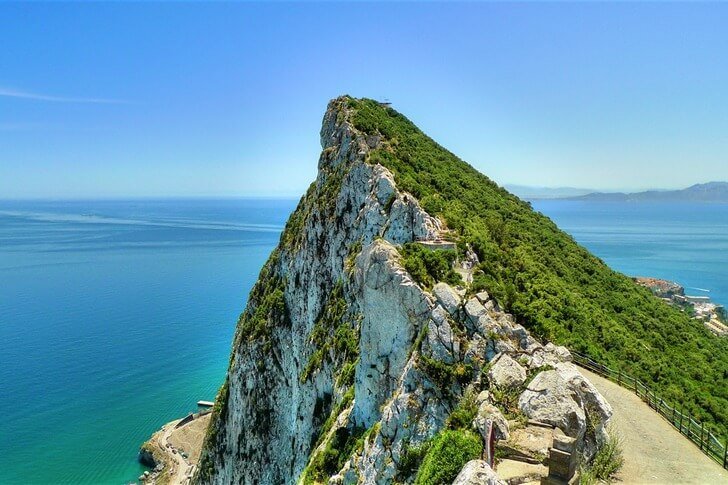
Magots
This species of narrow-nosed tailless macaques is a kind of symbol of Gibraltar. On the territory of Europe, only here they live in a natural environment and enjoy complete freedom - they pester tourists, steal food, penetrate homes. On the rock is their patrimony - the reserve Apes Den. You can watch the magots, take pictures, but it is forbidden to feed them. According to legend, as long as the monkeys are alive, Gibraltar will remain in British possession, so they are loved and protected.

ocean village
Resort complex with excellent infrastructure. Includes a 5-star hotel "Sunborn", residential apartments, a large office center. On the waterfront there are many boutiques of the most fashionable brands, restaurants and bars, nightclubs and casinos, and other cultural and entertainment venues. The marina in this area has more than 300 berths and accepts vessels up to 100 meters long. Boat trips along the Iberian Peninsula are popular.

Gibraltar airport
The takeoff and landing of airliners at the local airport is quite a spectacular sight. The fact is that due to the lack of space, the runway is very short - 1828 meters, and besides, it is surrounded on both sides by the sea. It also crosses Gibraltar's busiest highway. It has to be blocked with barriers to let the next plane through. Due to the proximity of the strait, the weather in the area is unpredictable. But, despite all the difficulties, the airport receives up to 30 aircraft every week.

Catalan Bay
This name has a bay at the eastern foot of the cliff, a sandy beach and a village located on the shore. The local beach is the second largest in Gibraltar, but the most popular among tourists and residents of the peninsula. Its history dates back to the 17th century. Today it is a picturesque, very clean and well-maintained recreation area with cafes and restaurants specializing in seafood. Nearby - parking, bus stop. Within walking distance is the Caletta Palace Hotel.

Casemates Square
It got its name from the soldiers' stone barracks built during the period of British colonization. Today they have been converted into a Crafts and Arts Centre. The perimeter of the square is surrounded by museums, cafes and bars, souvenir shops. In the center there is a monument dedicated to the soldiers of the Gibraltar Regiment. Also located here is the building of the Department of Health. The square is always noisy and crowded. Various festivals, concerts, celebrations are held.
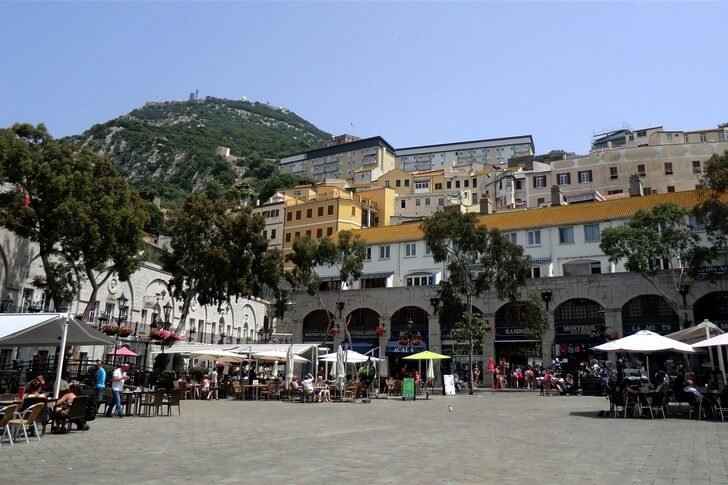
John McIntosh Square
Since 1940, it has been named after a well-known Gibraltar merchant, philanthropist and philanthropist who lived in the late 19th and early 20th centuries. Prior to that, it was called Market Square. Leads its history from the XIV century. Today, the main buildings of the city are located here - the city hall and the parliament, as well as the Tourist Information Center. Since 1992, it has been the site of official celebrations dedicated to Gibraltar's National Day on 10 September.
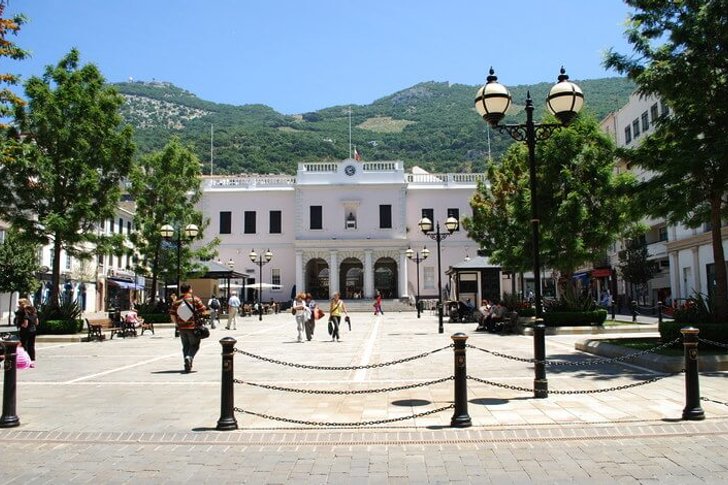
Gibraltar Museum
The opening took place in 1930. Museum exhibitions reflect the main stages of the history of Gibraltar. Here are the remains and tools of labor of primitive people, exhibitions ranging from the Phoenician to the British period. As well as extensive collections of weapons from different times, prints and lithographs, local flora and fauna. The museum complex includes unique Moorish baths of the XIV century. There is a small gift shop.
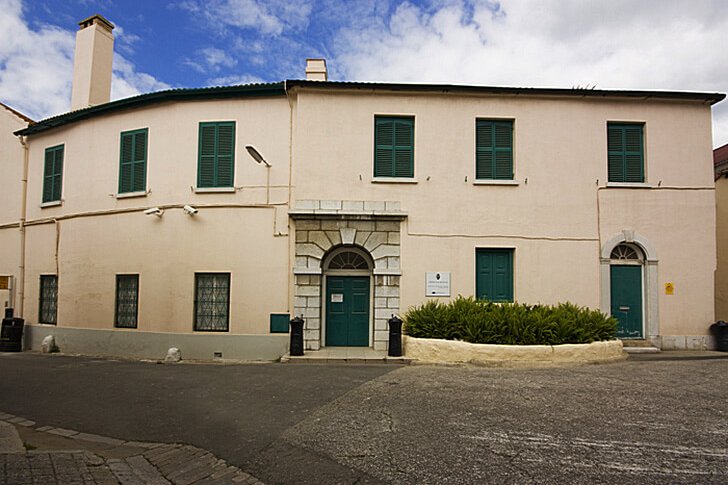
Church of St Mary the Crown
Center of the Catholic Faith in Gibraltar. Leads its history from the XV century - the time of Spanish rule. After the Great Siege, the building was badly damaged. The governor offered to restore it to replace part of the land that belonged to the church. It was used to redevelop Main Street. The clock tower was completed in 1820. The statue of a soldier at the entrance to the cathedral was received as a gift from the British Army Corps - Royal Engineers.
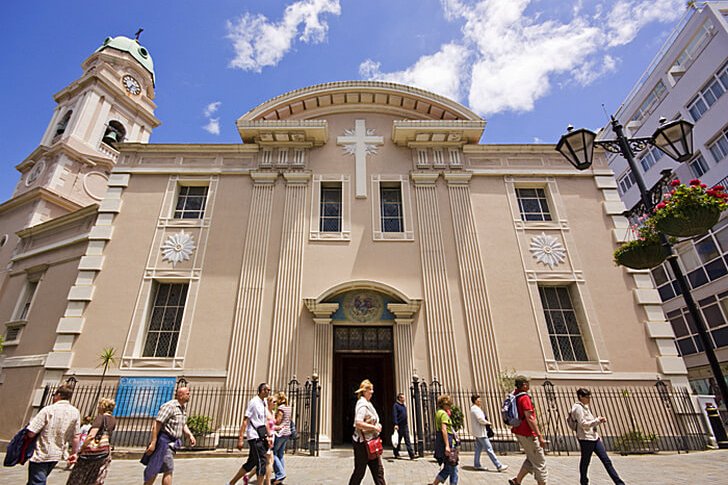
trafalgar cemetery
The first burials appeared in 1798. Although the name of the cemetery is associated with the legendary battle of 1805, only 2 of its participants are officially buried here. But there are several dozen unmarked graves that may well belong to British sailors. Basically, on the territory of a small cemetery, those who died in other battles of 1801-1812 are buried. As well as the victims of several epidemics of fever that occurred at the beginning of the 19th century.
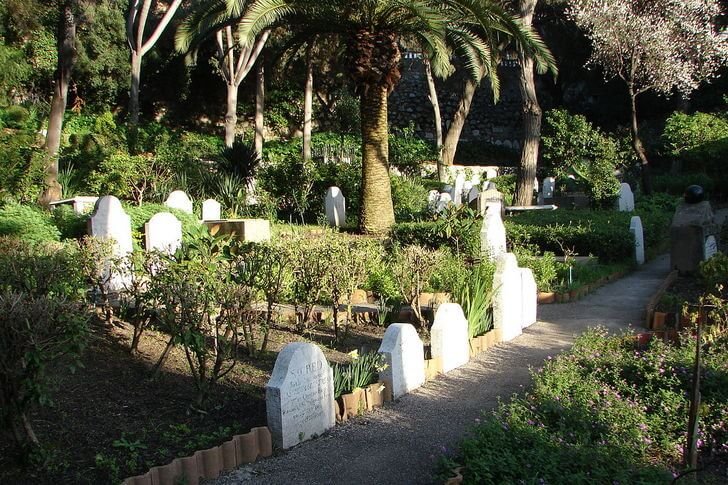
Gibraltar Botanical Garden
Date of foundation - 1816. Area - 6 hectares. There are about 2 thousand interesting species of tropical vegetation and trees. Some are over 200 years old, including the Dragon Tree, Pinia Pine, Olive Tree. On the territory of the botanical garden there is a Summer Theater, a Wildlife Park with exotic animals, an Italian garden Dell with ponds and waterfalls, a playground. As well as monuments to General Eliott and the Duke of Wellington.
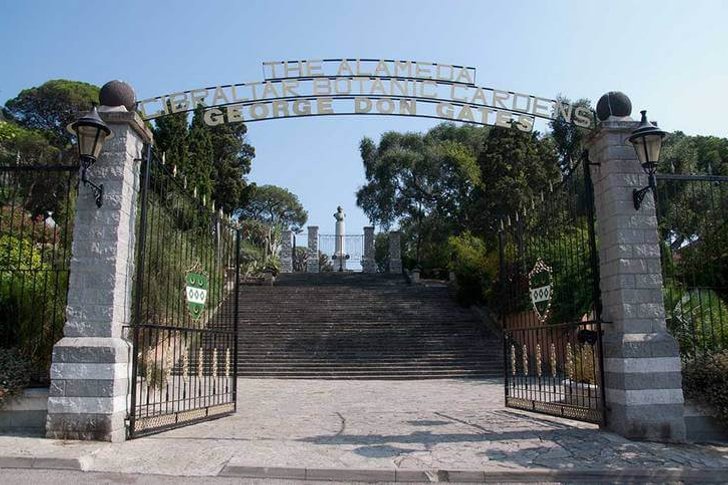
Moorish castle
It was originally built in the 8th century and radically rebuilt 6 centuries later. It is considered the largest defense structure of the Moorish period in Europe. It is located in the northwest of the rock massif. It consists of the surviving fortress walls, gates and a 100-meter tower. The walls of the complex are littered with potholes from cannonballs and artillery fire. Today, a museum is open here, only 4 rooms at the top of the tower are available for visits.
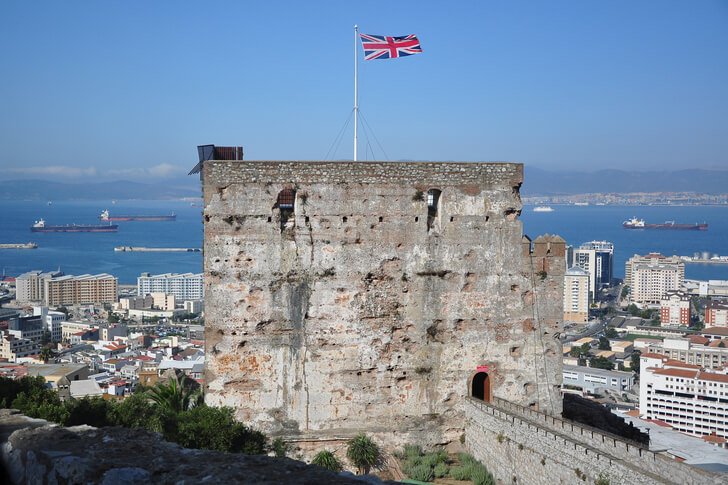
Artillery batteries and structures
One of the main military components of Gibraltar - coastal artillery - has now been turned into an object of the tourist business. At the top of the cliff is O'Hara's battery. Its main exhibit is a powerful 9.2-inch gun. The southernmost battery, Fort Harding, built in 1859, contains a 12.5 mm cannon weighing 50 tons. Princess Anne's battery of the 18th century consisted of 9 guns, in the 19th century 5.25-inch guns were added, 3 of them in closed towers, 1 underground.
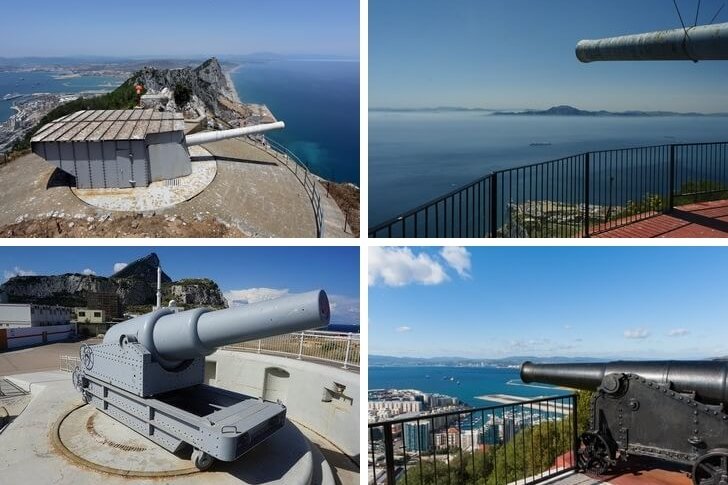
Tunnels from the Great Siege
The unique defense system of Gibraltar. The labyrinth of tunnels was built in 6 weeks by the British to protect against the combined forces of Spain and France in 1779-1783. They were carved by hand on the northern side of the rock. Largely thanks to the cannons moved here, England was able to win. During World War II, the tunnels were significantly expanded. Today, exhibition halls are open here, where guns, soldier dummies and other exhibits of military history are demonstrated.
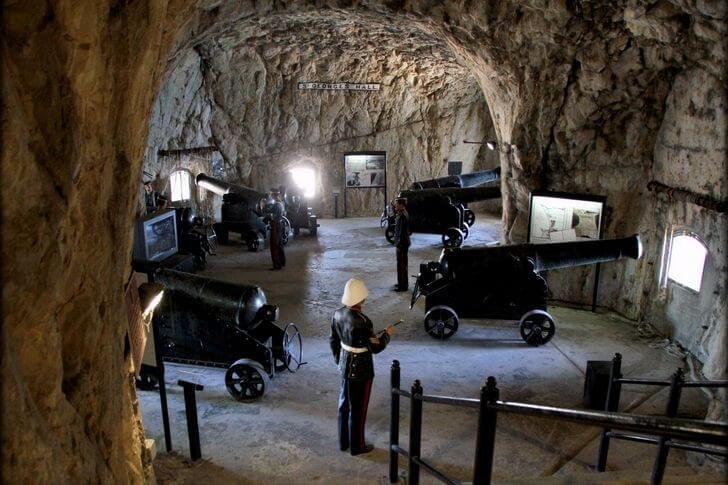
Tunnels from World War II
Siege tunnels were continued in the war years of the 40s, their total length was 50 km. They served as a shelter for local residents, and there were warehouses with ammunition, ammunition, and provisions. Today, only some of them are accessible to tourists, converted into a military museum, and serve as a venue for exhibitions and theatrical performances. Most of the labyrinth is still owned by the military leadership and is closed to the public.
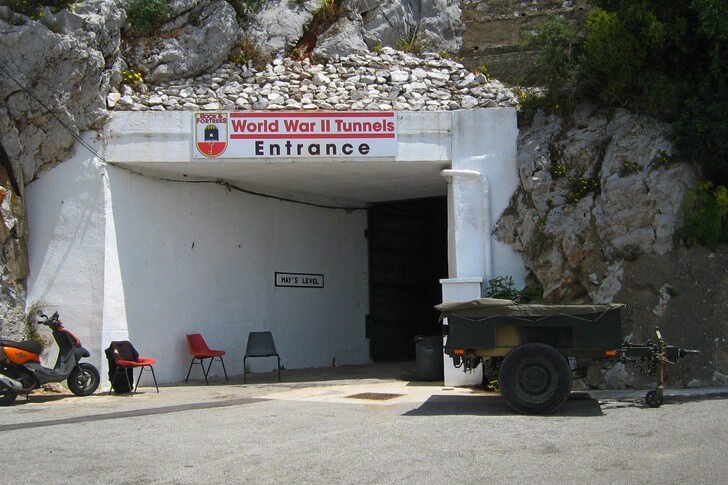
Cave of Saint Michael
A bewitching work of nature-craftswoman. The largest of the hundreds of caves on the Rock of Gibraltar. Located at an altitude of 300 meters. It is famous for its huge stalactite formations, which look fantastic in the light of multi-colored spotlights. It has 3 entrances and exits, numerous halls at different levels. The largest of them hosts classical music concerts. In the lower caves there is an underground lake. Traces of cavemen and rock art have been found here.
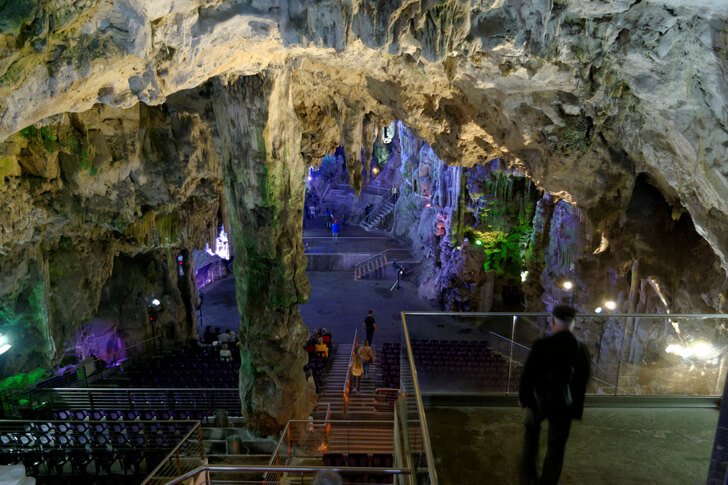
Trail "Mediterranean Steps"
The route is recommended only for trained tourists. Created by the British military in the 18th century as part of a communications system. With the help of steps, access to defensive posts and firing points on the rock was established. The trail starts at the Pillars of Hercules, passes through the nature reserve, along the eastern part of the cliff, and ends at its very top, near the batteries of O'Hara and Lord Airy. The length is 1800 meters. In 2007, the steps were reconstructed.
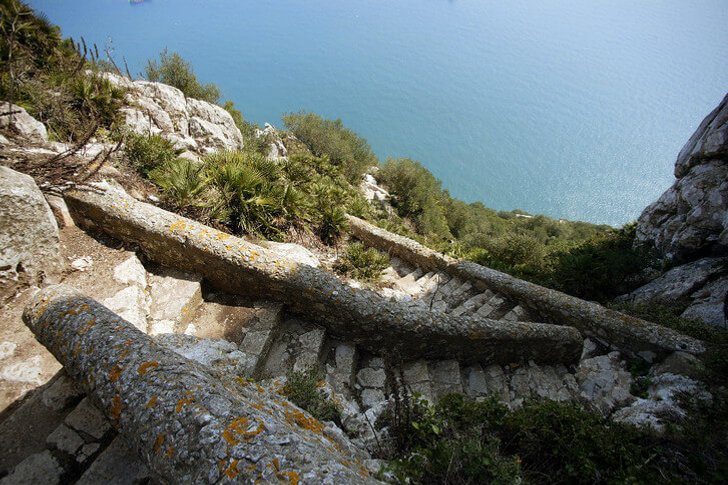
windsor suspension bridge
The opening took place in 2016. A bridge was built over a 50-meter gorge on the territory of the Upper Rock Reserve. Length - 71 meters. On both sides, it is firmly attached to the rock walls with the help of large supports installed at a depth of 12 meters. But still, when passing, there are slight fluctuations, which adds a portion of the thrill to an exciting walk. But the mesmerizing views of the city below and seascapes make you forget about the fear of heights.
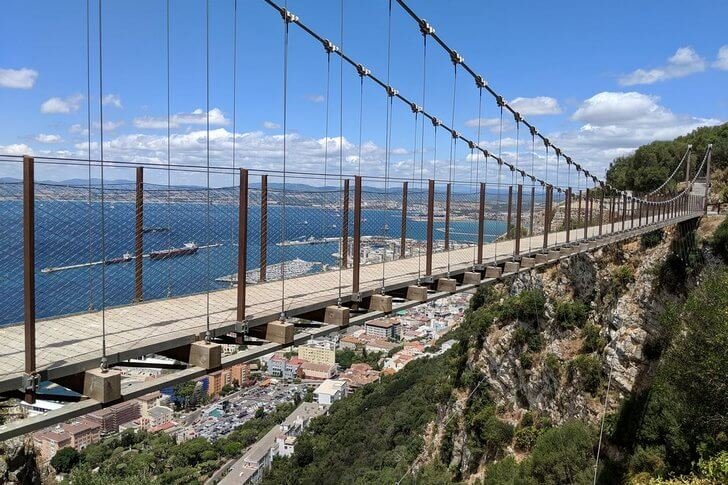
cable car
Connects the city center to the top of the Rock of Gibraltar. It was opened in 1966, subsequently modernized several times. The lower station is located near the botanical garden. The length of the road is 673 meters. Travel time is 6-7 minutes. Cabins are designed for 30 people. Near the upper station there are several observation platforms, a cafe, a souvenir shop. The trip includes a stop at the middle station, near the Monkey Lair, but only from November to March.
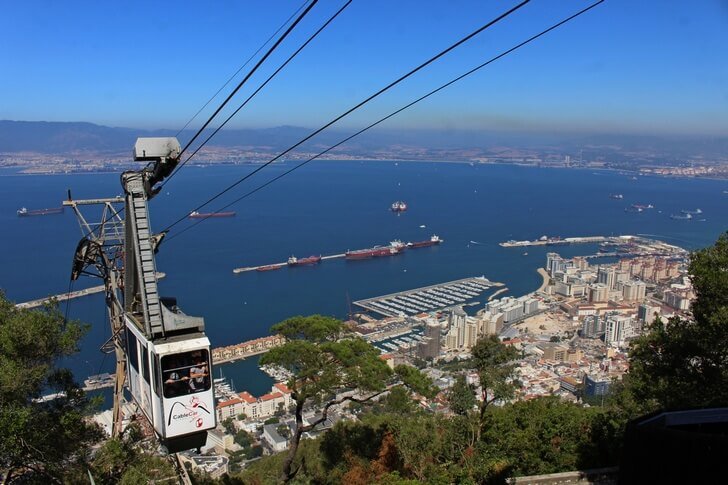
Cape Europe
An excellent observation deck from where the African coast is visible in clear weather. The southernmost point of the peninsula. Here stands the Trinity lighthouse, built in the 19th century and now operating. The light from it is visible to all ships passing along the strait. Since 1994 - fully automated. There are other noteworthy objects - a mosque, a Catholic chapel, a monument to General Sikorsky who died in 1943, coastal artillery guns, a large playground.
